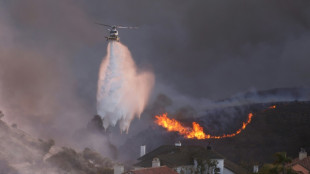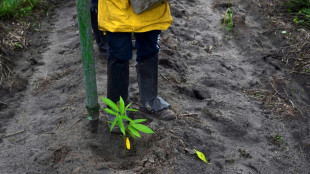Greek firefighters calm deadly Athens inferno
Greek emergency services fought back Tuesday against a massive wildfire that scorched the Athens suburbs, killing a woman, causing widespread damage and sending thousands of people fleeing from their homes.
A fire department spokesperson told AFP that "pockets of flame" were being dealt with but there were no longer "areas of particular concern".
Hundreds of firefighters, backed by around 200 fire engines and 20 water-bombing aircraft battled the blaze that started Sunday in Varnavas, some 35 kilometres (22 miles) from Athens.
The body of a Moldovan woman was found in a burned-out factory and at least 66 people have been treated for injuries, authorities said. Five firefighters have been hurt.
Fuelled by strong winds, the wildfire raced across parched landscape northeast of the capital, destroying dozens of houses, cars and businesses in the over 10,000 hectares (24,700 acres) of land it has devastated.
After a Greek appeal for international assistance, France, Italy, Czech Republic, Romania, Serbia and Turkey were sending hundreds of firefighters along with helicopters, fire engines and water tankers, authorities said.
The fire scaled Mount Pentelikon overlooking Athens and badly hit the suburbs of Nea Penteli, Palaia Penteli, Patima Halandriou and Vrilissia.
Sports halls including the Athens Olympic Stadium were set aside to shelter the homeless. One former Olympic hall was prepared for over 150 rescued pets.
"We saw huge flames, and at the same time (explosions) began. We thought we were at war," Nikos Karoulias, a 71-year-old former defender on Greece's national football team, told AFP in Penteli.
The body of a Moldovan worker in her 60s was found in a factory in the suburb of Halandri. A bouquet of white flowers was laid in tribute in the mess of burned out steel and burned chairs and tables.
Halandri mayor Simos Roussos told ERT state television that he saw nearly a dozen homes destroyed by fire in his town. Businesses, used car and coal yards and paint warehouses were also affected, he said.
"The fire travelled 50 kilometres and changed direction 10 times," Roussos said.
The mayors of Penteli and Varnavas, where the fire started, each reported a dozen homes destroyed in their areas.
The labour ministry banned outdoor working in areas hit by the fires because so many factories that burned on Monday contained toxic chemicals.
With much of the capital covered by acrid smoke for two straight days, scientists reported an alarming rise in hazardous airborne particles, particularly from Sunday night to Monday night.
"Never in a million years did I think a fire would come here," 65-year-old Sakis Morfis told AFP outside his gutted home in Vrilissia.
"We're without clothes, money, everything was burned inside," he said.
Costas Tsigkas, head of the association of Greek firefighter officers, told ERT the army of firefighters were on alert in case winds pick up again.
Greece's National Observatory, itself threatened by the wildfire, predicted temperatures of up to 38 degrees Celsius (100 Fahrenheit) on Tuesday, with wind gusts of up to 70 kilometres (44 miles) per hour.
- 'Unanswered questions' -
Greece's conservative government came under attack from the press and political rivals over the fire.
"Enough is enough," thundered the front page of Greece's top-selling centrist daily Ta Nea. The liberal Kathimerini said the "out of control" inferno "had left huge destruction (and) unanswered questions".
"Evacuate Maximou," said the left-wing Efsyn daily, referring to the building housing the prime minister's office.
Prime Minister Kyriakos Mitsotakis returned from holiday on Sunday because of the crisis. He was to head an emergency meeting on the fires on Tuesday.
The destruction revived memories of fires in Mati, a coastal area near Marathon, in July 2018 where 104 people died in a tragedy blamed on evacuation delays and errors.
The summer wildfire season in Greece this year has seen dozens of blazes after the Mediterranean country recorded its warmest winter and the hottest June and July since reliable data collection began in 1960.
Scientists say that human-induced fossil fuel emissions are worsening the length, frequency and intensity of heatwaves across the world.
O.Quinlivan--IP




